2025 Hyundai Ioniq 5 N First Drive: Electric wild child is crazy in all the right ways

YEONGAM, South Korea — Former Hyundai R&D boss Albert Biermann once told me that the company’s N cars should be “a little crazy.” And if you’ve ever driven the Elantra N, Kona N or Veloster N (RIP), you know exactly what I mean. Borderline unhinged and raucous in the best way, Hyundai’s N cars might not be the sharpest or most sophisticated pocket rockets, but sweet saltwater taffy, they’re a whale of a time.
It’s an ethos that’s served the Hyundai N lineup well, and a spirit that I’m happy to report is very much alive in the company’s first electric rowdy boi: the 2025 Hyundai Ioniq 5 N. That’s despite the fact that this is not a hot hatch, but a compact crossover the size of a Tucson that tips the scales at 2.2 tons – enough to make Biermann call it the “literal elephant in the room.”
The N-specific changes start with – what else? – more power. The Ioniq 5 N uses a new 84-kilowatt-hour battery pack (versus the standard car’s 77.4) and pair of electric motors that churn out a combined 601 horsepower and 545 pound-feet of torque. Hit the “NGB” button on the steering wheel – shorthand for N Grin Boost – and output is increased to 641 hp for brief moments, allowing the Ioniq 5 N to accelerate to 60 mph in an estimated 3.3 seconds.
The Ioniq 5 N’s driving range is still TBD and Hyundai isn’t offering any ballpark estimates. The standard long-range, dual-motor Ioniq 5 has an EPA-estimated range of 260 miles, but it also has that smaller 77.4-kWh battery. Perhaps the N’s larger pack will negate the range drop that comes with the big boost of power. We’ll know for sure in a few months time.
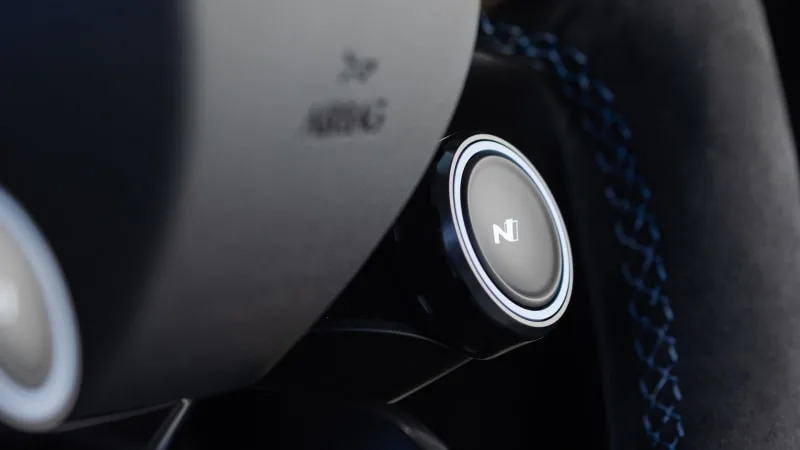
In order to better withstand the higher demands of racy driving, the Ioniq 5’s battery has increased thermal management protection. You can precondition the battery to Drag or Track settings – the former giving you an all-out burst of power while the latter is said to provide more consistent performance over multiple laps. Also, don’t forget, the Ioniq 5’s 800-volt architecture allows for faster-than-average charging speeds of up to 238 kilowatts. Hyundai’s even planning to install Level 3 fast-chargers at select tracks around the world.
The Ioniq 5 N will let you manually adjust the power distribution between the two motors, allowing you to send up to 100% of the available torque to either the front or rear axle. This is also how you unlock the N Drift Optimizer – a version of the technology that sister company Kia offers on the EV6 GT – which makes sliding the rump ‘round tight corners much easier. It’s the stuff you should only save for a closed course, and absolutely not for doing doughnuts in the Walmart parking lot at 3:00 a.m. Ahem.
Regenerative braking also plays a part in the N experience. As in all other Hyundai Group EVs, the i-Pedal mode ratchets up regen enough in normal driving to let you drive with one pedal. The Ioniq 5 N adds a new step beyond that with N-Pedal: switch it one while lapping a track, and the regen is increased so you aren’t digging into the mechanical brakes as much. It’s like a one-pedal race mode, and it’s tuned remarkably well.
From there, it’s more of what you expect. The Ioniq 5 N has 21-inch wheels and Pirelli P Zero 275/35 summer tires at all four corners. The body is stronger with increased lateral rigidity, and the electric drive motors are encased in WRC-like axles to better handle the increased torque while also reducing unsprung mass. Stiffer chassis components and a quicker steering rack round out the changes, and the whole car is bundled up in a hot-looking wrapper with “Luminous Orange” accents and purposeful bits of aero add-ons.
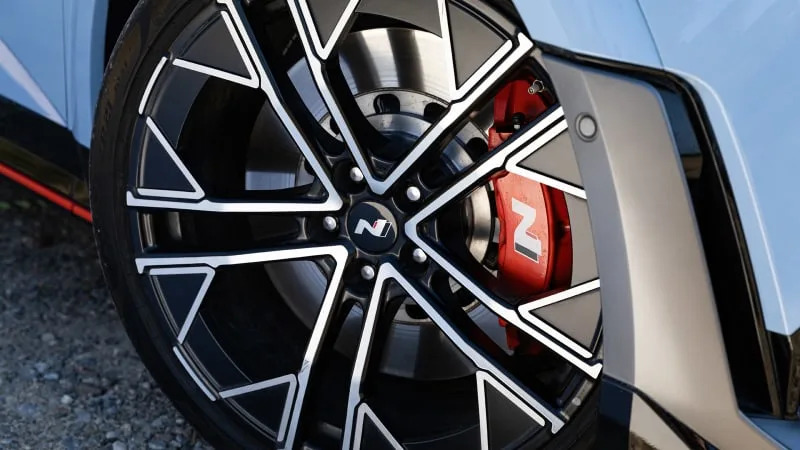
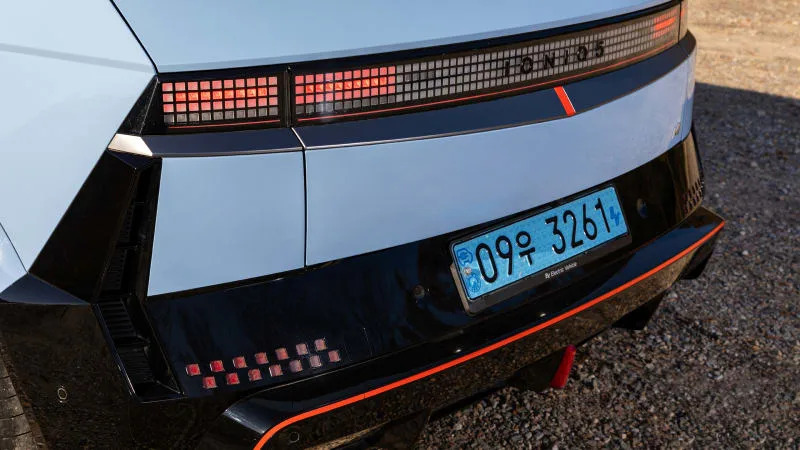
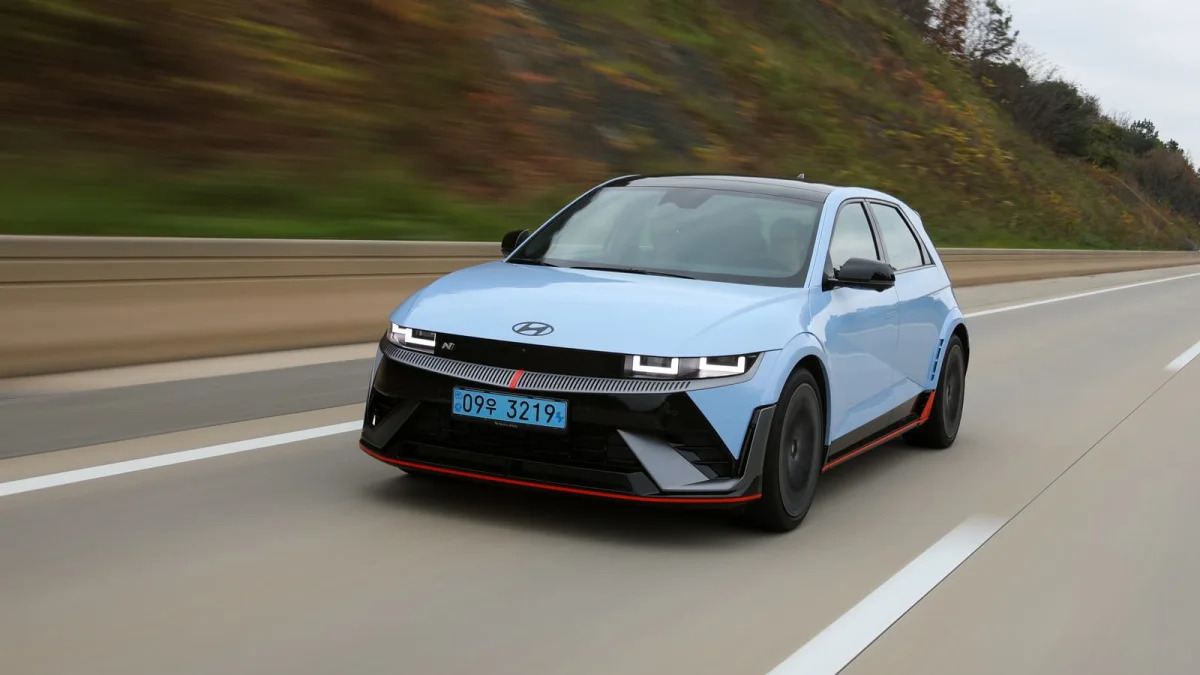
These predictable changes would be enough to turn the Ioniq 5 into a ripper, but again, what’s an N car without a little bit of crazy? Without question, the most interesting piece of the Ioniq 5 N puzzle is something called N E-Shift, which mimics the experience of driving a car with an internal combustion engine and planetary gear set, either swapping through imaginary cogs on its own, or at the driver’s request via the steering wheel-mounted paddles.
With N E-Shift, the Ioniq 5 doesn’t drive like an EV. The electric motors initially delay response to give the feeling of turbo lag. The power peaks and surges like the turbo engines in Hyundai’s other N cars. You can rev high in each gear and the Ioniq 5 will lurch and cut power while your fake tach needle bangs off the fake rev limiter. The experience is legitimately uncanny. And it’s fun. Like, a ton of fun.
I know N E-Shift sounds like just another EV gimmick. But after a few laps around the Korea International Circuit – the country’s former Formula 1 track – I can’t imagine driving the Ioniq 5 N with this tech turned off. No, it won’t trick your brain into thinking you’re in a gas-powered sports car, but the sound of the ‘engine’ and kick of the ‘shifts’ really heightens this car’s visceral nature. It gives the Ioniq 5 attitude, and genuinely adds to the rambunctious vibe that’s a hallmark of every N product.
It makes the Ioniq 5 N more interesting to drive on public roads, too – even the heavily speed-regulated streets of South Korea. Part of what I’ve always loved about Hyundai’s N cars is that they’re fun as heck for bombing around town or taking highway on-ramps with gusto. Is the Ioniq 5 N too stiff for daily driving? It seems like it’ll be OK, but then South Korea’s roads are also impeccably paved. We’ll let you know how it does after a drive up the 405 in Los Angeles or virtually anywhere in southeastern Michigan.
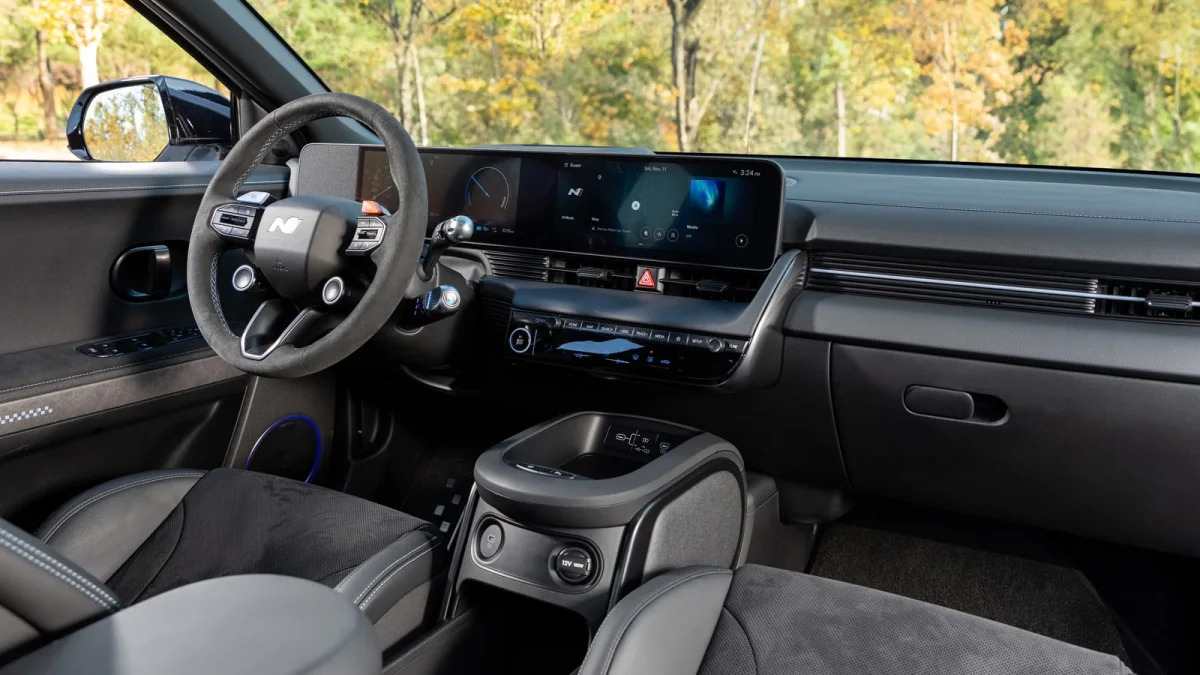
Inside, the N doesn’t greatly differ from other Ioniq 5s, but there are a few meaningful changes, including a rear window wiper, which is a bigger win than you might think. The 5’s nifty sliding center console is gone, replaced by a lighter, fixed setup with a wireless charging pad. Heavily bolstered sport seats provide enough comfort for long stints behind the wheel, and there are little Alcantara touches here and there – including the steering wheel.
None of the Ioniq 5’s in-car tech is lost in the transition to N mode; the 12.3-inch center screen runs an updated version of Hyundai’s multimedia software that finally – finally! – allows wireless Apple CarPlay and Android Auto connections. The usual smattering of driver-assistance features will be offered, too. This won’t be some stripper-spec sports car. Nor should it be, considering the Ioniq 5 N will likely be priced in the $65,000 to $70,000 range when it goes on sale next March – an educated guess based on current Ioniq 5 MSRPs.
Everything that’s great about the standard Ioniq 5 is alive and well in the N, with the added benefit of this car being properly rambunctious and fun to throw around. If this is how Hyundai plans to bring its N brand into the electric era, then we have a lot to look forward to indeed.



